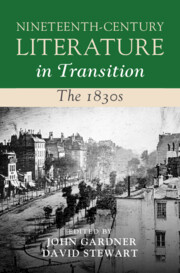Book contents
- Nineteenth-Century Literature in Transition: The 1830s
- Nineteenth-Century Literature in Transition
- Nineteenth-Century Literature in Transition: The 1830s
- Copyright page
- Contents
- Figures
- Contributors
- Acknowledgements
- Introduction
- Chapter 1 On the Eve
- Chapter 2 ‘An Infectious Madness’
- Chapter 3 Augustus Hardin Beaumont, Slavery Apologias, and Popular Radical Literature in the 1830s
- Chapter 4 Patterns of Industry
- Chapter 5 Mother Earth
- Chapter 6 The Polite Fictions of Slavery
- Chapter 7 Suffering, Sentiment, and the Rise of Humanitarian Literature in the 1830s
- Chapter 8 Steam and Iron in the 1830s
- Chapter 9 Lithography and the Comic Image 1825–1840
- Chapter 10 Jorrocks’s Canon
- Chapter 11 Tennyson, Dickens, Poe, Browning, and the Brontës:Blackwood’s Magazine and ‘The Foreheads of a New Generation’
- Chapter 12 Boz in London: The 1830s and the Urban Turn in the English Novel
- Chapter 13 Letitia Elizabeth Landon, Chronicler of the 1830s
- Chapter 14 Railway Imaginary in the 1830s
- Chapter 15 The Emerging Language of Photography
- Afterword
- Index
Chapter 6 - The Polite Fictions of Slavery
British Anti-slavery in the 1830s
Published online by Cambridge University Press: 30 May 2024
- Nineteenth-Century Literature in Transition: The 1830s
- Nineteenth-Century Literature in Transition
- Nineteenth-Century Literature in Transition: The 1830s
- Copyright page
- Contents
- Figures
- Contributors
- Acknowledgements
- Introduction
- Chapter 1 On the Eve
- Chapter 2 ‘An Infectious Madness’
- Chapter 3 Augustus Hardin Beaumont, Slavery Apologias, and Popular Radical Literature in the 1830s
- Chapter 4 Patterns of Industry
- Chapter 5 Mother Earth
- Chapter 6 The Polite Fictions of Slavery
- Chapter 7 Suffering, Sentiment, and the Rise of Humanitarian Literature in the 1830s
- Chapter 8 Steam and Iron in the 1830s
- Chapter 9 Lithography and the Comic Image 1825–1840
- Chapter 10 Jorrocks’s Canon
- Chapter 11 Tennyson, Dickens, Poe, Browning, and the Brontës:Blackwood’s Magazine and ‘The Foreheads of a New Generation’
- Chapter 12 Boz in London: The 1830s and the Urban Turn in the English Novel
- Chapter 13 Letitia Elizabeth Landon, Chronicler of the 1830s
- Chapter 14 Railway Imaginary in the 1830s
- Chapter 15 The Emerging Language of Photography
- Afterword
- Index
Summary
This chapter explores the transformation of British responses to slavery during the 1830s through the writing of Frances Trollope. In this decade, Britons declared the abolition of colonial slavery as proof of their superior morals and impeccable manners. Trollope’s travel narrative Domestic Manners of the Americans (1832) and anti-slavery novel Jonathan Jefferson Whitlaw (1838) participated in the reconstruction of racism as a peculiarly American form of bad manners. Although Black women are virtually absent from Domestic Manners, Jonathan Jefferson Whitlaw is notable for its range of Black female characters and its frank exploration of the sexual exploitation to which enslaved women were subjected. Trollope’s belated acknowledgement of the gendered effects of enslavement reflects the sensational impact of the publication of The History of Mary Prince (1831). Trollope reveals a historic kinship and complicity between Great Britain and the United States as slaveholding nations. The reception of Prince’s History among British abolitionists who did not want to acknowledge this complicity demonstrated how well-intentioned good manners could function as a form of racism.
- Type
- Chapter
- Information
- Nineteenth-Century Literature in Transition: The 1830s , pp. 127 - 146Publisher: Cambridge University PressPrint publication year: 2024



